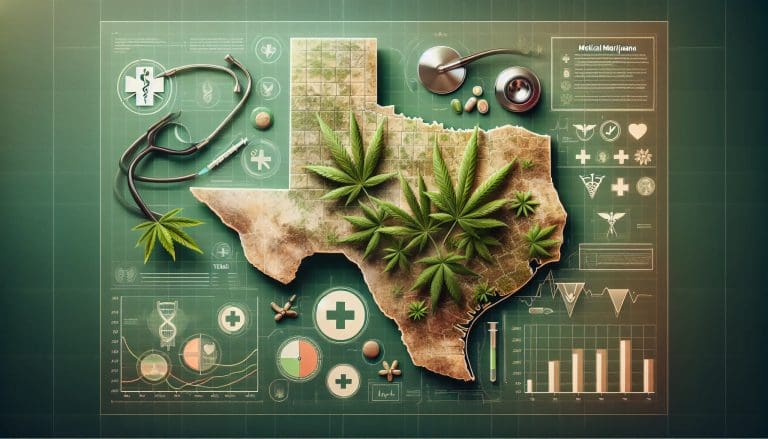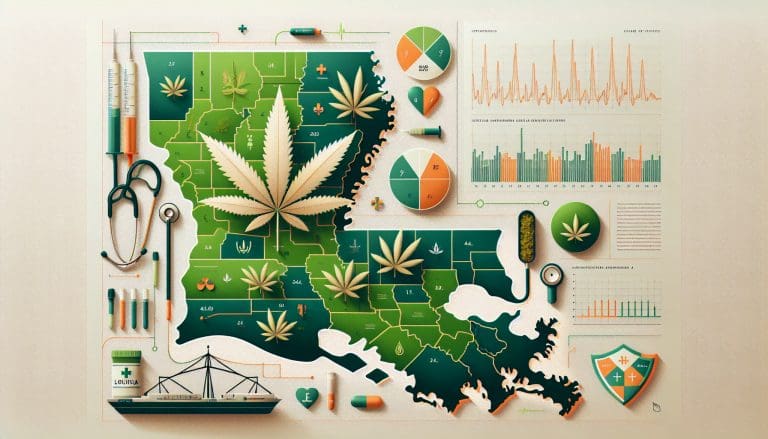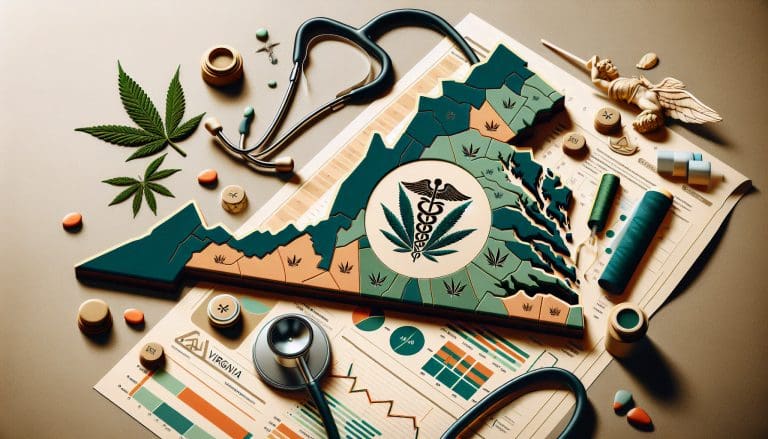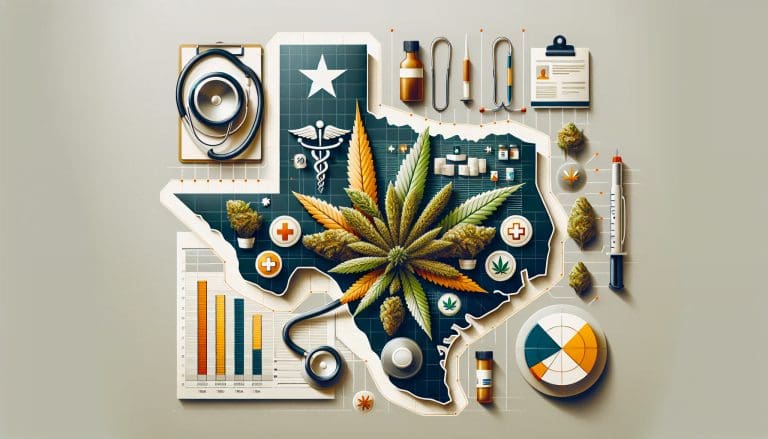Your Comprehensive Guide to Medical Marijuana in New Jersey: Legalities, Access, and Patient Information
Medical marijuana has been legal in New Jersey since 2010, following the signing of the New Jersey Compassionate Use Medical Marijuana Act. This legislation allows patients with qualifying conditions to access and use medical marijuana as part of their treatment plan. This guide provides comprehensive information on the legalities, access, and patient information regarding medical marijuana in New Jersey.
Is Medical Marijuana Legal In New Jersey?
Yes, medical marijuana is legal in New Jersey. The state legalized medical marijuana in 2010 under the New Jersey Compassionate Use Medical Marijuana Act. The law allows patients with qualifying conditions to use medical marijuana with a doctor’s recommendation. For more information, visit the New Jersey Department of Health’s website.
How to Get a Medical Marijuana Card in New Jersey
Obtaining a medical marijuana card in New Jersey involves several steps. First, you must have a qualifying condition. Next, you must obtain a physician’s recommendation. After receiving the recommendation, you can apply for the medical marijuana card through the New Jersey Department of Health. For a detailed guide on how to apply, visit the New Jersey Department of Health’s website.
Qualifying conditions for Medical marijuana cards in New Jersey
The state of New Jersey has outlined several qualifying conditions for medical marijuana use. These include but are not limited to: Amyotrophic lateral sclerosis (ALS), Multiple sclerosis (MS), Terminal cancer, Muscular dystrophy, Inflammatory bowel disease, including Crohn’s disease. For a full list of qualifying conditions, visit the New Jersey Department of Health’s website.
Can I Apply For A Medical Marijuana Card In New Jersey Online if I am a resident?
Yes, New Jersey residents can apply for a medical marijuana card online. The application process is managed by the New Jersey Department of Health. For more information on how to apply online, visit the New Jersey Department of Health’s website.
What are the costs and requirements to get marijuana card online in New Jersey?
The cost to apply for a medical marijuana card in New Jersey is $149.99. However, seniors, military veterans, and individuals receiving government assistance may qualify for a reduced fee. The requirements include being a New Jersey resident, having a qualifying condition, and obtaining a physician’s recommendation.
How old do I need to be to get a medical marijuana card in New Jersey?
You must be at least 18 years old to apply for a medical marijuana card in New Jersey. However, minors can qualify for medical marijuana use if they have a caregiver who is approved by the Department of Health.
Can You Grow Medical Marijuana In New Jersey?
Currently, it is illegal to grow medical marijuana at home in New Jersey. Only state-licensed dispensaries, known as Alternative Treatment Centers, are allowed to cultivate medical marijuana.
What are the limits for medical marijuana cards in New Jersey?
Patients with a medical marijuana card in New Jersey are allowed to possess up to 3 ounces of medical marijuana per month. However, the monthly limit can be increased if recommended by a physician.
Is Medical Marijuana Legal In New Jersey?
Yes, medical marijuana is legal in the state of New Jersey. The state’s Compassionate Use Medical Marijuana Act (CUMMA) was signed into law by Governor Jon Corzine on January 18, 2010. This law allows patients with certain debilitating health conditions to use marijuana for medicinal purposes under the recommendation of a New Jersey-licensed physician. New Jersey Department of Health provides comprehensive information about the state’s medical marijuana program.
Legalities of Medical Marijuana in New Jersey
Under the CUMMA, patients and their caregivers are protected from “arrest, prosecution, property forfeiture, and criminal and other penalties.” However, there are strict regulations in place. For instance, patients must have a bona fide relationship with the physician who recommends them for the program. This means the physician must be responsible for the ongoing care and treatment of the patient’s debilitating medical condition. You can read the full text of the CUMMA here.
Access to Medical Marijuana in New Jersey
Patients who are registered with the program can purchase medical marijuana from one of the state’s Alternative Treatment Centers (ATCs). As of 2021, there are 13 ATCs in New Jersey. The New Jersey Department of Health provides a list of these centers on their website.
Patient Information
Patients must be residents of New Jersey and have a recommendation from a New Jersey-licensed physician to qualify for the program. They must also have a qualifying debilitating medical condition. These conditions include, but are not limited to, cancer, glaucoma, HIV/AIDS, inflammatory bowel disease, and multiple sclerosis. A full list of qualifying conditions can be found on the New Jersey Department of Health’s website.
Once a patient has been recommended for the program, they can apply for a registry identification card through the New Jersey Department of Health. This card allows them to purchase medical marijuana from an ATC. The application process can be completed online, and there is no additional registration fee. Reduced fees are available for seniors, military veterans, and individuals who qualify for certain state and federal assistance programs.
It’s important to note that while medical marijuana is legal in New Jersey, recreational marijuana is not. Patients should be aware of the legal implications and ensure they are using medical marijuana responsibly and in accordance with state law.
How to Get a Medical Marijuana Card in New Jersey
Obtaining a medical marijuana card in New Jersey is a process that involves several steps. This guide will walk you through the process, ensuring you have all the information you need to successfully apply for and receive your card.
Step 1: Determine Eligibility
Before you can apply for a medical marijuana card in New Jersey, you must first determine if you are eligible. According to the New Jersey Department of Health, you must be a resident of New Jersey and have a qualifying medical condition. These conditions include, but are not limited to, cancer, glaucoma, epilepsy, and chronic pain.
Step 2: Obtain a Physician’s Recommendation
Once you have determined that you are eligible, the next step is to obtain a recommendation from a physician. The physician must be registered with the New Jersey Medicinal Marijuana Program (NJMMP) and must confirm that you have a qualifying medical condition. You can find a list of registered physicians on the NJMMP website.
Step 3: Apply for the Card
After you have obtained a physician’s recommendation, you can apply for the medical marijuana card. The application is available online through the NJMMP website. You will need to provide personal information, proof of residency, and the physician’s recommendation. There is no additional application fee, although reduced fees are available for seniors, military veterans, and individuals on certain government assistance programs.
Step 4: Wait for Approval
Once you have submitted your application, you will need to wait for approval. The NJMMP reviews applications in the order they are received. Once your application is approved, you will receive your medical marijuana card in the mail.
Step 5: Purchase Medical Marijuana
With your medical marijuana card, you can purchase medical marijuana from any of the state’s approved Alternative Treatment Centers (ATCs). You can find a list of ATCs on the NJMMP website.
Remember, it’s important to follow all state laws and regulations when using medical marijuana. This includes not driving under the influence and only using medical marijuana in private, non-public spaces.
By following these steps, you can obtain a medical marijuana card in New Jersey and begin using medical marijuana to treat your qualifying medical condition.
Qualifying Conditions for Medical Marijuana Cards in New Jersey
Medical marijuana has been legal in New Jersey since 2010, when the Compassionate Use Medical Marijuana Act was signed into law. This legislation allows patients with certain qualifying conditions to use medical marijuana as a form of treatment. The New Jersey Department of Health oversees the state’s Medical Marijuana Program, which is responsible for issuing medical marijuana cards to qualifying patients.
What are the Qualifying Conditions?
According to the New Jersey Department of Health, the following conditions may qualify a patient for a medical marijuana card:
- Amyotrophic lateral sclerosis (ALS)
- Multiple sclerosis (MS)
- Terminal cancer
- Muscular dystrophy
- Inflammatory bowel disease, including Crohn’s disease
- Terminal illness, if the physician has determined a prognosis of less than 12 months of life
In addition, the following conditions apply if resistant to, or if the patient is intolerant to, conventional therapy:
- Seizure disorder, including epilepsy
- Intractable skeletal muscular spasticity
- Glaucoma
Furthermore, the following conditions apply if severe or chronic pain, severe nausea or vomiting, cachexia, or wasting syndrome results from the condition or treatment thereof:
- Positive status for human immunodeficiency virus (HIV)
- Acquired immune deficiency syndrome (AIDS)
- Cancer
How to Qualify for a Medical Marijuana Card in New Jersey
To qualify for a medical marijuana card in New Jersey, a patient must be a resident of the state and have a recommendation from a New Jersey-licensed physician. The physician must confirm that the patient has one of the qualifying conditions listed above and that medical marijuana could help alleviate their symptoms. Once the physician’s recommendation is obtained, the patient can apply for a medical marijuana card through the New Jersey Medical Marijuana Program.
It’s important to note that not all physicians are willing or able to recommend medical marijuana. Therefore, patients may need to seek out a physician who specializes in medical marijuana treatment.
Conclusion
While the list of qualifying conditions for a medical marijuana card in New Jersey is extensive, it’s not exhaustive. The state is continually reviewing and updating the list of qualifying conditions, so it’s important for patients to stay informed about the latest developments. If you believe you may qualify for a medical marijuana card in New Jersey, consult with a healthcare provider to discuss your options.
Can I Apply For A Medical Marijuana Card In New Jersey Online if I am a resident?
Yes, residents of New Jersey can apply for a medical marijuana card online. The New Jersey Department of Health’s Medicinal Marijuana Program (MMP) allows eligible patients to register and apply for a card through their online portal. This process is designed to be user-friendly and efficient, allowing patients to access medical marijuana as quickly as possible.
How to Apply Online
To apply for a medical marijuana card online in New Jersey, you must first visit a healthcare practitioner who is registered with the MMP. This practitioner will determine if you have a qualifying condition and if medical marijuana is an appropriate treatment option for you. If approved, the practitioner will provide you with a Patient Reference Number and instructions on how to complete your online registration.
Once you have your Patient Reference Number, you can complete your application on the New Jersey MMP’s website. The online application requires you to provide personal information, proof of New Jersey residency, and a photograph for your medical marijuana card. You will also need to pay a registration fee.
Qualifying Conditions
Not all medical conditions qualify for medical marijuana use in New Jersey. According to the New Jersey Department of Health, qualifying conditions include Amyotrophic lateral sclerosis (ALS), Multiple Sclerosis, Terminal cancer, Muscular dystrophy, Inflammatory bowel disease, and certain Terminal illnesses, among others. If the patient is resistant or intolerant to conventional therapy, conditions like Seizure disorder, Intractable skeletal muscular spasticity, and Post-Traumatic Stress Disorder also qualify.
Benefits of Applying Online
Applying for a medical marijuana card online in New Jersey has several benefits. It is a faster and more convenient process than applying in person. You can complete the application at your own pace and from the comfort of your own home. Additionally, the online system allows you to easily track the status of your application and receive updates via email.
Once your application is approved and you have paid the registration fee, your medical marijuana card will be mailed to you. With this card, you can purchase medical marijuana from any Alternative Treatment Center in New Jersey.
Remember, the use of medical marijuana is regulated in New Jersey. It is important to use it responsibly and in accordance with the state’s laws and regulations.
What are the costs and requirements to get a marijuana card online in New Jersey?
Obtaining a medical marijuana card in New Jersey involves a process that includes meeting specific requirements and covering certain costs. This guide will provide you with the necessary information to navigate this process smoothly.
Costs Associated with Obtaining a Medical Marijuana Card in New Jersey
The costs associated with obtaining a medical marijuana card in New Jersey include a registration fee and the cost of a mandatory doctor’s visit. The registration fee is free, but there are discounts available for seniors, military veterans, and individuals on government assistance programs. The cost of the doctor’s visit can vary, but it is $149.99 here at MMJ. This visit is necessary to get a recommendation for medical marijuana. It’s important to note that these costs are not covered by insurance due to the federal status of marijuana.
Requirements for Obtaining a Medical Marijuana Card in New Jersey
To qualify for a medical marijuana card in New Jersey, you must be a resident of the state and have a qualifying medical condition. These conditions include, but are not limited to, cancer, glaucoma, multiple sclerosis, muscular dystrophy, and terminal illnesses. A complete list of qualifying conditions can be found on the New Jersey Department of Health’s website.
In addition to having a qualifying condition, you must also obtain a recommendation from a physician registered with the New Jersey Medical Marijuana Program. This involves a consultation where the physician will assess your condition and determine if medical marijuana is a suitable treatment option for you.
Once you have a physician’s recommendation, you can apply for your medical marijuana card online through the New Jersey Medical Marijuana Program’s website. The application process involves submitting your recommendation, proof of residency, and the required fee.
It’s important to note that the process of obtaining a medical marijuana card in New Jersey can take several weeks. This includes the time it takes for your application to be processed and for your card to be mailed to you.
While the process may seem daunting, it’s a necessary step for those who seek the therapeutic benefits of medical marijuana. With your card, you’ll be able to purchase medical marijuana from state-licensed dispensaries and use it to manage your condition.
For more information on the costs and requirements of obtaining a medical marijuana card in New Jersey, visit the New Jersey Department of Health’s website.
How old do I need to be to get a medical marijuana card in New Jersey?
In the state of New Jersey, the age requirement for obtaining a medical marijuana card is 18 years old. This is in line with the state’s legal age of adulthood. However, there are exceptions for minors who have qualifying medical conditions. In such cases, a parent or legal guardian must apply on their behalf and act as their caregiver.
Medical Marijuana for Minors in New Jersey
While the general age requirement is 18, New Jersey law allows minors with certain debilitating medical conditions to access medical marijuana. These conditions include epilepsy, intractable skeletal muscular spasticity, and severe or chronic pain, among others. The full list of qualifying conditions can be found on the New Jersey Department of Health’s website.
For minors to qualify, they must have a recommendation from a physician who has ongoing responsibility for the assessment, care, and treatment of the patient’s debilitating medical condition. Additionally, a psychiatrist who is registered with the New Jersey Medical Marijuana Program must also provide a recommendation.
Applying for a Medical Marijuana Card as a Minor
When applying for a medical marijuana card for a minor, the application process is slightly different. The minor’s parent or legal guardian must register as the patient’s caregiver. This caregiver will be responsible for obtaining and administering the medical marijuana. The caregiver must be at least 18 years old and a resident of New Jersey. They must also agree to assist with the patient’s medical use of marijuana and must not be the patient’s physician.
More information on the application process for minors can be found on the New Jersey Department of Health’s website.
Conclusion
While the age requirement for obtaining a medical marijuana card in New Jersey is generally 18, exceptions are made for minors with qualifying medical conditions. These minors must have a parent or legal guardian apply on their behalf and act as their caregiver. As always, it’s important to consult with a healthcare provider to determine if medical marijuana is a suitable treatment option.
Can You Grow Medical Marijuana In New Jersey?
As a patient considering the use of medical marijuana in New Jersey, you may be wondering about the possibility of growing your own cannabis plants. This is a common question, especially for those who wish to have more control over their medication or are looking to save on costs. However, the laws surrounding home cultivation of medical marijuana vary from state to state. In New Jersey, the regulations are quite specific.
Current Legislation on Home Cultivation in New Jersey
According to the New Jersey Department of Health, the current law does not permit patients or their caregivers to cultivate cannabis at home. The state’s medical marijuana program only allows for the purchase of cannabis from state-licensed Alternative Treatment Centers (ATCs).
While this may seem restrictive, it’s important to note that the state’s regulations are designed to ensure the safety and quality of medical marijuana products. ATCs are required to adhere to strict cultivation and processing standards, which are intended to protect patients from potential contaminants and ensure consistent dosing.
Penalties for Unauthorized Cultivation
Unauthorized cultivation of marijuana in New Jersey is considered a serious offense. According to the New Jersey Cannabis Regulatory, Enforcement Assistance, and Marketplace Modernization Act, individuals found guilty of unauthorized cultivation could face significant fines and potential jail time.
Future Possibilities for Home Cultivation
While the current law does not allow for home cultivation of medical marijuana, it’s possible that this could change in the future. As the state’s medical marijuana program continues to evolve, there may be opportunities for patients and advocates to push for changes to the law. However, until such changes are made, it’s crucial for patients to adhere to the current regulations to avoid legal repercussions.
Conclusion
While the inability to grow your own medical marijuana in New Jersey may seem limiting, it’s important to remember that the state’s medical marijuana program is designed to ensure patient safety and product quality. By purchasing from state-licensed ATCs, patients can be confident in the consistency and purity of their medication. As always, it’s essential to stay informed about the current laws and regulations surrounding medical marijuana in your state.
What are the limits for medical marijuana cards in New Jersey?
Medical marijuana has been legal in New Jersey since 2010, and the state has set specific limits for medical marijuana cardholders. Understanding these limits is crucial for patients to stay within the legal boundaries and to make the most of their medical marijuana treatment.
Quantity Limits
According to the New Jersey Department of Health, patients with a valid medical marijuana card are allowed to possess up to 3 ounces of medical marijuana in a 30-day period. This limit is subject to change based on the recommendations of a patient’s healthcare provider.
Purchase Limits
Patients can purchase medical marijuana from any of the state’s approved Alternative Treatment Centers (ATCs). The amount purchased should not exceed the prescribed limit of 3 ounces per month. However, exceptions can be made for terminally ill patients.
Usage Limits
While medical marijuana cardholders in New Jersey are allowed to use their medicine, there are restrictions on where it can be used. Public use of medical marijuana is prohibited. It is also illegal to operate, navigate, or be in actual physical control of any vehicle, aircraft, railroad train, stationary heavy equipment or vessel while under the influence of marijuana.
Transportation Limits
Patients are allowed to transport their medical marijuana, but it must be in the original packaging from the ATC. It is also recommended to carry your medical marijuana card and a copy of your certification during transportation.
Home Cultivation
Currently, home cultivation of medical marijuana is not allowed in New Jersey. All medical marijuana must be purchased from a state-licensed ATC.
Understanding these limits can help patients avoid legal complications and ensure they are using their medical marijuana responsibly and effectively. For more information, patients can visit the New Jersey Department of Health’s Medical Marijuana Program website.


















